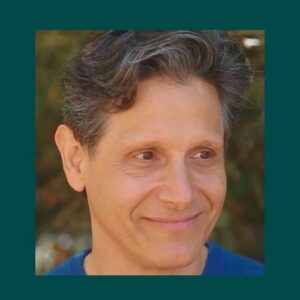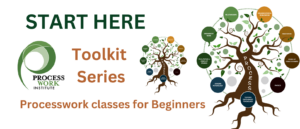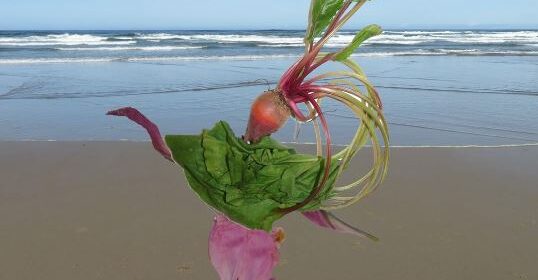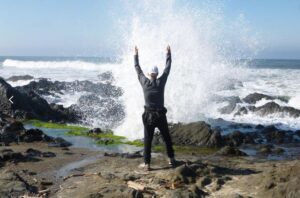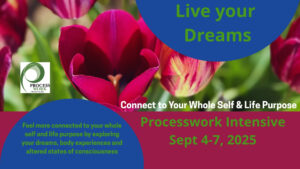
Live Your Dreams: Connect to Your Whole Self & Life Purpose
Processwork Intensive
Online September 4-7, 2025
Intensive Course Registration Fee $640 USD
Partial scholarships offered to support participation equity – find out more below and apply now.
Live your dreaming process
The Process Work Institute invites you to live your dreaming process and connect to your whole self and life purpose.
Discover the transformative power of your dreams, body wisdom, and altered states of consciousness. Join our experienced team for an experiential journey that will unlock your creativity, deepen self-awareness, and connect you to your path of heart.
Over the course of four days we will be exploring pathways to discover and deepen a sense of our life’s meaning and purpose. Together we will learn tools to delve into the creativity and learning within dream work.
We will unravel the wisdom that exists within our physical symptoms and body experiences, and we will explore and cultivate awareness of the unexpected gifts that emerge from our altered states of consciousness and addictive tendencies.
As an introductory intensive we will study the basics of the paradigm, discovering how Processwork can enrich our journey and help us connect with our paths of heart and a more fulfilling sense of life and purpose.
No prior knowledge of Processwork is needed. You will be invited into a personally transformative learning experience, supported by an experienced team.
Get prepared with introductory materials available on the course site.
Partial scholarships offered to support participation equity – find out more below and apply early.
Who is this for?
- Seekers of Purpose: Individuals longing to live more authentically and connect with their heart’s true calling.
- Facilitators, Coaches & Therapists: Helping professionals looking to add powerful Processwork tools to their personal or professional toolkit.
- Dreamers & Body-Based Explorers: Anyone curious about the messages within their dreams, physical symptoms, or non-ordinary states.
- Beginners to Processwork: No prior experience necessary—this is an introductory, supportive, and experiential training.
Why choose this Intensive?
- Integrative Approach: Learn to work with dreams, body symptoms, and altered states through a unified Processwork lens that connects mind, body, and spirit.
- Expert Guidance: Study with a seasoned, compassionate teaching team deeply grounded in Processwork and personal transformation.
- Meaningful Connection: Be part of a warm, interactive learning container designed to foster real connection, insight, and mutual support.
- Purpose-Driven Learning: Go beyond theory—engage in experiential practices that help you access your life’s deeper meaning and creative direction.
What will I learn?
- Dreamwork Tools: Practical methods to track, unfold, and interpret night and day dreams for guidance and self-discovery.
- Body Symptom Awareness: Skills for working with physical symptoms and sensations as meaningful expressions of the unconscious.
- Working with Altered States: Tools to explore the wisdom within non-ordinary states and addictive tendencies in a safe, grounded way.
- Life Purpose Discovery: Foundational Processwork skills to help you align with your personal path and connect to a sense of meaning.
What’s involved?
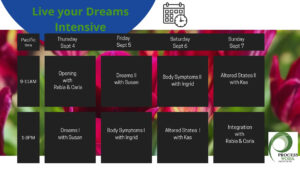
Session One: Opening our Learning Container
9-11AM Sept 4
Hosted by Rabia Mashkoor and Carla Orellana.
Welcome from Hellene Gronda, Executive Director.
This opening session invites us to arrive fully and connect—to ourselves, to each other, and to the deeper intention behind this intensive. Through facilitated exercises, reflection, and group sharing, we will create a safe and vibrant container for our collective journey. This is a space to meet fellow travelers, explore your learning edges, and set personal intentions for the four days ahead. In Processwork, relationships and awareness of the field are essential parts of the learning process. By cultivating a sense of trust and shared purpose from the very beginning, we lay the foundation for transformation to take root. This session is not just an introduction—it is where the journey begins.
Session Two & Three: Dreamwork with Susan Kocen
1-3PM Sept 4 and 9-11AM Sept 5
Why do we dream at night? What if our dreams can provide a key to unlocking guidance for our deepest life purpose and meaning?
In our Introduction to Process Oriented Dreamwork classes we will learn some process-oriented methods that allow us to uncover the messages and guidance that are present in our dreams.
Together we will focus on the value of tracking and unfolding our night (and day) time visions to ask and answer questions about the intricacies of our lives and our life purpose.
We’ll explore awareness practices, and the beginner’s mindset that open the doors to our innate creativity, imagination and symbolic thinking.
Join us on this inspiring adventure of self-discovery and transformation!
Session Four & Five: Body Symptoms with Ingrid Rose
1-3PM Sept 5 and 9-11AM Sept 6
The Dreambody appears as “sentient, generally unrecognized sensations that eventually manifest in dream images, body experiences, and symptoms. . . what we see in our dreams we feel in our bodies. Likewise, what we experience in our bodies we can find in our dreams” – Arnold Mindell, 1984, p.64. Dreambody.
In these two classes we will be working with body symptoms and our body experiences as a meaningful part of our lives. Focusing on the dreaming process behind the consensus reality level of how we usually identify with the body, allows us access to valuable information which brings insight into what is trying to make itself known on our personal development paths. Body experiences and symptoms may also reflect on community and social issues as well.
We will use Processwork ideas to view body experience as part of the larger dreaming process and learn techniques and tools for unfolding symptoms and body experiences, gaining skills in this area through practice and theory.
Session Six & Seven: Altered States with Kas Robinson
1-3PM Sept 6 and 9-11AM Sept 7
In these two classes we will be focusing on non-ordinary (altered) states of consciousness and addictive tendencies. Addictive tendencies touch our lives and can be a gateway to discovering marginalized energies, unlocking creativity and finding meaning.. There is much suffering with and around addictions and we will share Processwork methods that help access a deeper awareness, marginalized energies, creativity and can reduce the pull of the addictive tendencies over time. I will be introducing some processwork ideas and tools to deepen and unfold the altered states individuals are reaching for with addictive tendencies.
Many of these altered states embody energies and creativity that are marginalized not only by individuals but by families, communities and the culture we are living within. Additionally we will discuss pathways to integrate these altered states into our everyday lives.
Session Eight: Landing our Learning (Integration) with Rabia Mashkoor and Carla Orellana
1-3PM Sept 7
The closing session is a vital space to integrate the insights, challenges, and awakenings from our four days together. Through experiential practices, group dialogue, and creative reflection, we will revisit key moments and explore how they connect to our larger life path and purpose. Integration helps us recognize how the dreaming we’ve uncovered—in our night dreams, body experiences, and altered states—can continue to support and guide us beyond the intensive. This is a time to honor the community we’ve built, give space to what is still unfolding, and take meaningful steps toward embodying our learning in daily life. This session ensures that your journey doesn’t end here—it deepens and continues.
Meet the Intensive Team
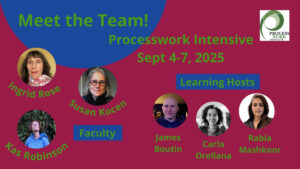
About Kas
Kas Robinson, PhD, Dipl PW. Kas is originally from New Zealand/Aotearoa. She has been a faculty member at the Process Work Institute of Portland since 2007, and she is a clinical director at a behavioral healthcare agency. Kas loves processwork methods for discovering meaning, accessing altered states, addressing conflict, and grounding discoveries and insights into our everyday lives. Kas is deeply committed to Processwork’s awareness of diversity, its anti-oppressive lens, and to diving into the challenges of life.
About Susan
Susan Kocen, MA, Dipl PW. is a Processwork Diplomat, currently working in private practice, and on the Teaching Faculty at the Process Work Institute. A dreamer since landing on earth, she has also been a working artist and designer, a Community Program Builder, a counselor for Portland’s Houseless, mentally diverse community, and an Acupuncturist. All roads have led to and been informed by a deep dreaming life, and an attention to lived experience informed by creativity, sensitivity, and the deep democracy of many levels of experience.
About Ingrid
Ingrid Rose PhD, Dipl PW. has spent the past 4 decades exploring various modalities that enhance human potential and growth, all of which contribute to her eclectic style and method in working with others. She has had extensive experience teaching Process Work to many groups in Portland and all over the world. As well as being a clinical supervisor and faculty member at PWI, Ingrid also has a private practice in which she works with a large range of presentations, as well as presenting to groups on diversity issues and conflict situations.
About Rabia
Rabia Mashkoor, MAPOF, is a facilitator of personal and social change, with a background as an HR professional. She is a graduate of the Process Work Institute’s Masters in Process Oriented Facilitation, and an advanced candidate in our mastery level Diploma program. Rabia is a Pakistani-French-Canadian, Muslim woman, and a mother, currently working as a leadership coach in the health sector, and as a facilitator in private practice.
About Carla
Carla Orellana is a bilingual (Spanish/English) facilitator and community builder who brings creativity, emotional depth, and a deep commitment to authenticity. She is a graduate of the Process Work Institute’s Certificate in Processwork, with a background in art therapy, emotional intelligence, and Strategic Design Thinking, she explores power, relationships, and inner work through a Processwork lens. Carla describes her path as that of a “delicate activist,” connecting personal transformation with social change and deep democracy.
About James
James Boutin, MAPOF, is an educator, facilitator, and trainer from Seattle, WA. He is a graduate of the Process Work Institute’s Masters in Process Oriented Facilitation, and an advanced candidate in our mastery level Diploma program. James serves as PWI’s Certificate Coordinator and online course host/producer. He is passionate about Processwork education and is developing Bitesize Processwork, regular free community tutorials to help beginners get started. James specializes in generative conflict, and his professional work focuses on helping people establish generative conflict practices and cultures within their personal and professional lives.
What does it mean to participate?
The Processwork Intensive is a confidential, online adult learning environment focused on ideas and practices for personal and community transformation. The experiential activities invite an exploration of lesser known aspects of our experience and they may invoke emotional and psychological stress.
All reasonable care is taken to support participants within the learning container, however each person is responsible for their own needs and boundaries. This is a group learning experience and the intensive faculty and host team are not able to provide one-to-one support for individuals.
Participants are encouraged to have their own peer or professional relational supports available in case they need individual support with their intensive experience.
If you have experienced significant trauma related psychological difficulties either in the past or present that may impact your participation, please check in with yourself and consider carefully if this is the right training experience for you at this time.
By registering for the Intensive, you agree to take personal responsibility for your experience and to seek external individual support if you need it.
The Intensive Course is taught in English, with an awareness and sensitivity to the experience of those for who English may be a second (or third or fourth) language. We welcome a multilingual group and ask for shared awareness of the challenges of using English when it is a second language. Participants should ensure they are comfortable with their own level of understanding of English conversation and instruction.
Registration Fees
Intensive Course Registration Fees includes all live sessions, all session recordings*, handouts and learning resources, and an interactive private online community space for asking questions any time and connecting with other participants.
Intensive Course Registration Fee $640 USD
*Intensive Recordings available for 6 months (until February 28, 2026).
Financial Equity
PWI recognizes the global and systemic forces that unequally impact people’s opportunities to participate. We offer partial scholarships on a sliding scale to support participation equity for the Intensive.
If you are from an emerging economy or carrying the burden of systemic inequality and impacted by financial disadvantage, please email pwi@processwork.org to request support for your Intensive participation. Scholarships are limited and allocated based on need, please apply early.


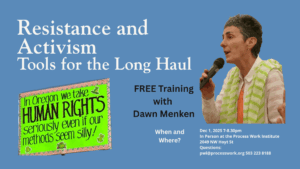

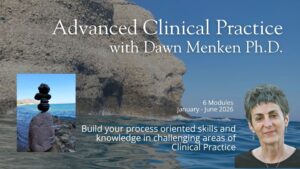



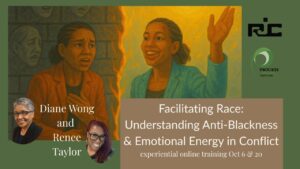

 Renee Taylor is a body worker, Christian minister, and spiritual guide who brings the power of trust, belief, and intentional surrender into her healing and facilitation work. A long-time partner in women’s empowerment initiatives, she weaves together embodied presence, spiritual strength, and emotional attunement to guide transformation.
Renee Taylor is a body worker, Christian minister, and spiritual guide who brings the power of trust, belief, and intentional surrender into her healing and facilitation work. A long-time partner in women’s empowerment initiatives, she weaves together embodied presence, spiritual strength, and emotional attunement to guide transformation.

